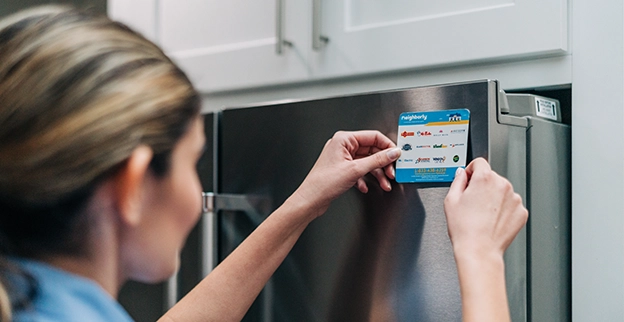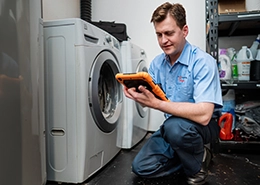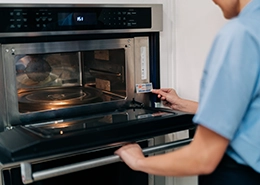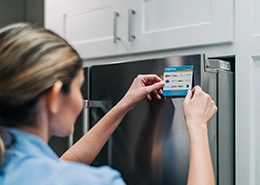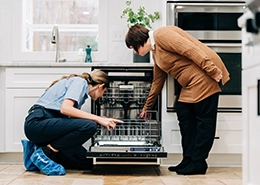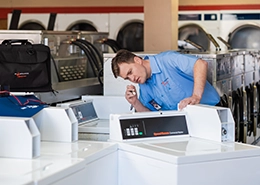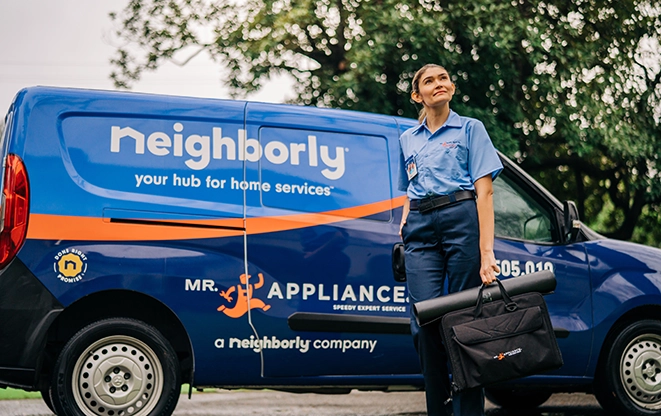Many Elkhart homeowners who experience refrigerator issues often put off the repair process. From doors that won’t shut properly to leaks, these small issues are indicative of larger ones lurking right around the corner. Not only will choosing Elkhart refrigerator repair make your life more convenient, but it will also save you money on your energy bills and prevent the need for larger repairs in the future. With that in mind, seeking professional service for your household appliance today seems like a smart idea that can seriously benefit your home and wallet. But how do you know exactly when to call for refrigerator repair in Elkhart, IN? And what causes the need for it anyway?
Since a fridge uses a compressor and evaporator system to cycle refrigerant throughout the unit, you’ll often face issues with these crucial parts. Sometimes the need for repairs is as plain as day, while other times, it might go completely unnoticed. This is one of the reasons we can't recommend regular fridge maintenance enough. Scheduling annual servicing appointments for this major appliance can help catch small issues before they turn into big ones. No matter what condition your fridge is in, give us a call. We offer scheduled and emergency repairs to ensure your most pressing needs are met. Here's a rundown of how we handle refrigerator repair in Elkhart, IN:
Inspection & Diagnosis
After you call us and schedule service for your faulty fridge, our service technicians will arrive on time, ready to get to work. After asking you for insight into what's been going wrong with your fridge, we'll narrow down the issue by troubleshooting the unit until we find the culprit. Because fridge issues can occur for a wide range of reasons, a thorough inspection and correct diagnosis are the most important parts of applying a solution that works and lasts.
Quality Repair Solutions
During our inspection and testing of your refrigerator, we found out what was causing it to fail. Fridges are complex appliances, however, their only function is to produce cool air. Multiple parts go into this function, and while a system is dedicated to doing this, other parts help regulate the temperature, signal the system to turn on and off and keep the cool air contained. No surprise, these turn out to be the parts that need replacement most often. We'll go into more detail about their function and the issues they can cause when broken, dirty, or faulty below.
Door gaskets. Gaskets or door seals are what create the vacuum-like seal on your fridge door. They're why you may struggle to open your fridge once you've just closed it, but when ripped or damaged, they may not create the same secure seal. A fridge door that doesn't properly seal may let cool air seep out, signaling the thermostat to trigger the compressor to turn on. This puts added stress on your appliance and increases your energy usage and utility bills.
Thermostat. This vital part measures the internal temperature of your fridge. When it reaches below the set limit, it will trigger the compressor to turn on, which will start pumping refrigerant through the cooling system. Thermostats aren't made to last forever, and if yours becomes faulty, it may read an optimal temperature that your fridge is not. Reading too high will mean the compressor never turns on, while reading too low means it will never turn off. This puts extra tension on your fridge or may result in a lack of cool air and prematurely spoiled food.
Condenser fan. The condenser coil is the part within your fridge that releases heat from the refrigerant. It needs a fan to help transfer heat away from the liquid, but fans often get dusty and dirty, and those that do not get cleaned regularly can slow down and may break. If this happens, you may hear strange noises coming from your fridge or experience a slow production of cool air.
Frozen defrost drain. When the defrost drain in your fridge becomes clogged, you may notice water leaks around the base of your refrigerator. Water on your floors poses a safety risk for your family and guests and can even lead to water damage and mold. Other causes of leaks include damage to your water line if you have a built-in water dispenser in your fridge.
